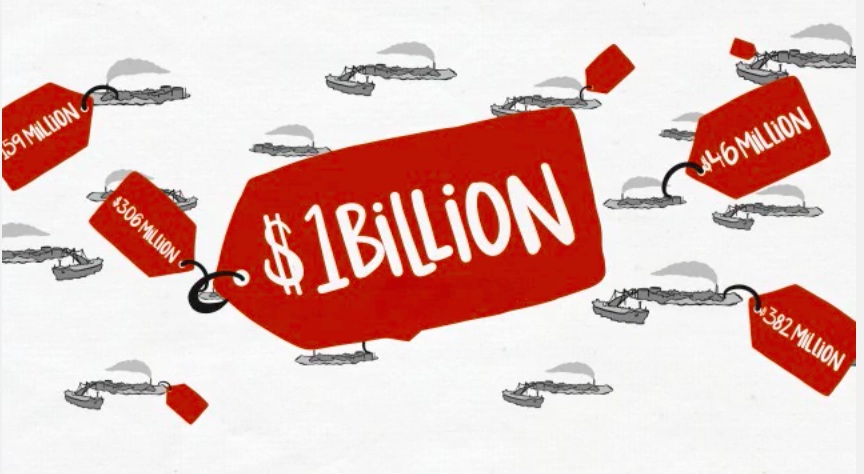The B.C. government is subsidizing the liquefied natural gas industry to the tune of hundreds of millions of dollars and British Columbians are going to pay the price, according to a new report by Sierra Club B.C.
The report, Hydro Bill Madness: The BC Government Goes For Broke With Your Money, lays out the impact of tax breaks, subsidies and reduced electricity rates negotiated by industry.
“Power subsidies to even just two or three of the proposed LNG plants could amount to hundreds of millions of dollars per year,” says a press release accompanying the report.
Two LNG export terminals have been approved in B.C. — Petronas’ Pacific Northwest LNG project on Lelu Island near Prince Rupert and the Woodfibre LNG plant in Howe Sound near Squamish. Another 18 are proposed.
Both companies have been major donors to the BC Liberal Party, which has ruled the province for 16 years and faces an election on May 9.
Malaysian-owned Pacific Northwest LNG donated more than $18,000 to the BC Liberals since 2014, while Indonesian-based Woodfibre has found itself in the midst of a growing scandal over illegal donations.
The Globe and Mail recently revealed that two Woodfibre lobbyists were reimbursed by their company for more than $75,000 in donations to the BC Liberals. This practice, which conceals the true source of political donations, is illegal. Elections BC has handed the investigation into lobbyists’ donations to the RCMP. Woodfibre also donated almost $60,000 to the BC Liberals in 2014 and 2015.
These donations took place while Woodfibre negotiated a subsidy on electricity rates and other tax breaks from the province.
In November 2013, the B.C. government announced it would charge the LNG sector $83.02 per megawatt/hour for electricity. But three years later, in November 2016, the government announced it would lower that rate to $54.34 — a 35 per cent cut.
“That reduced rate will not cover the cost of production, so ratepayers will have to absorb the loss,” reads the Sierra Club report.
Looking just at the two approved LNG plants in British Columbia, Sierra Club found BC Hydro ratepayers could be on the hook for more than $150 million per year in subsidies if the plants use grid electricity.
“Construction of any of the 18 other plants currently being proposed would dramatically increase that amount,” reads the report.
Last year, the BC Liberals promised to have at least three LNG export terminals in operation by 2020, but not a single plant is yet under construction due to market uncertainty created by falling natural gas prices and the rise of renewables.
“Why is our government expecting British Columbians to pay a handout to international corporations each time we pay our hydro bill,” said Sierra Club BC campaigns director Caitlyn Vernon. “In their desperation to secure a deal, they are making terrible deals with serious consequences for all B.C. residents.”
Not only are LNG companies receiving a deeply subsidized electricity rate, but the power needs of LNG plants and northeastern B.C.’s fracked gas fields have been used to justify the construction of the $8.8-billion Site C dam — also being built with public money.
“The B.C. government is building an expensive dam we don’t need in order to offer subsidies to fracking and LNG companies, with BC Hydro ratepayers footing the bill for generations to come,” Vernon said.
The corporate handouts don’t end there. In return for access to British Columbia’s resources, oil and gas companies are expected to pay royalties. However, the B.C. government has been waiving much of these royalty payments — a practice called giving “royalty credits.”
In 2016, the B.C. government handed out $348 million in royalty credits and approved the carry-over of more than $520 million in future royalty credits by oil and gas producers, according to the Sierra Club report.
When those liabilities are applied to the earnings from 2016, oil and gas revenues were in the red by $365 million.
“In other words, if you factor in future lost royalty revenue because of subsidies allocated in 2016, the natural gas sector actually cost the B.C. government, and therefore B.C. taxpayers, a million dollars per day in fiscal year 2016,” says the report.
Additionally, in 2013 the B.C. government announced a seven per cent LNG tax — but as the import price in Asia collapsed, this rate was cut in half to 3.5 per cent.
Sierra Club argues the subsidies go beyond the LNG industry and also apply to Kinder Morgan’s Trans Mountain pipeline expansion. That pipeline will be powered by subsidized electricity at a cost to ratepayers of at least $27 million per year, according to the Sierra Club report. Across the 20-year life of that pipeline, the subsidy will amount to $540 million.
Kinder Morgan and its Alberta-based backers, the Canadian Association of Petroleum Producers, the Canadian Energy Pipeline Association and oilsands producers contracted to ship oil on the new pipeline, donated almost $800,000 to the BC Liberal Party. ![]()
Read more: Energy, BC Election 2017, BC Politics, Environment
















Tyee Commenting Guidelines
Comments that violate guidelines risk being deleted, and violations may result in a temporary or permanent user ban. Maintain the spirit of good conversation to stay in the discussion.
*Please note The Tyee is not a forum for spreading misinformation about COVID-19, denying its existence or minimizing its risk to public health.
Do:
Do not: